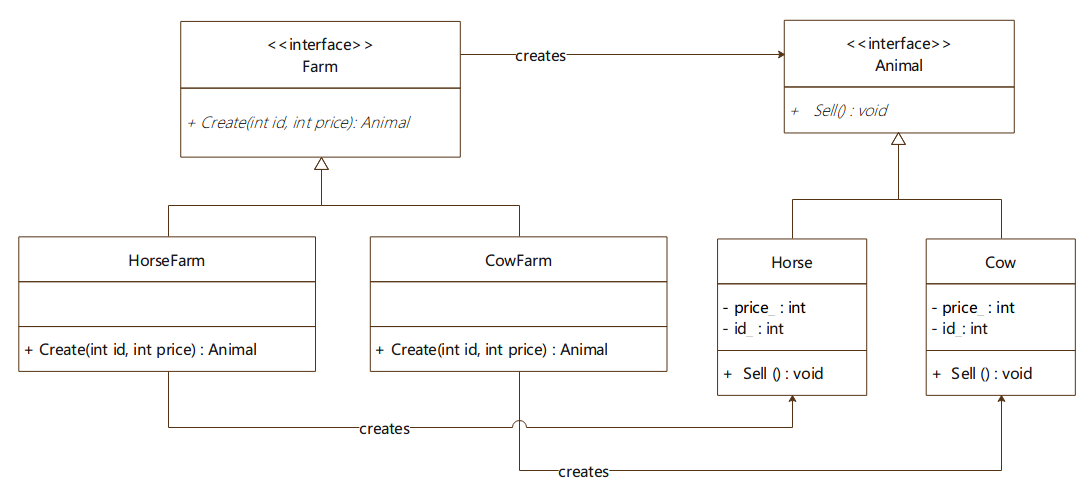继续之前的设计模式第四弹,这次是大名鼎鼎的工厂方法模式。
使用情景
定义一个用于创建对象的接口,让子类决定实例化哪一个类。Factory Method是创建型模式,使一个类的实例化延迟到其子类。
Factory有工厂的意思,简单来看,这个模式利用到了上一篇的Template Method模式用来生成具体的实例,说得更清楚一点,工厂方法模式将创建对象的过程延迟到子类实现,其他的父类的步骤保持完整。
问题引入
想象一个养殖业的农民,他刚开始仅仅在养马场养马,每个马都需要养殖长大之后在市面出售,后来他获得足够的利润之后,扩展业务也养牛,但是在牛场养牛,每头牛也是需要养殖长大之后在市面出售的。在刚开始的时候,我们需要记录每只马的养殖过程,后面还要记录它的售价。如果你前面只有养马的程序(包括生产、饲养、销售的过程),比如下面这样
1
2
3
4
5
6
7
8
|
class Farm {
public:
CreateHorse();
FeedHorse();
SellHorse();
private:
Horse horse_;
}
|
需要添加金养牛的程序,那么大多数情况会出现一个switch的分支,随着饲养的品种越来越多,最后会在生产、饲养和售卖的各个过程中出现多个switch分支。如果我是农场主,代码会陷入“分支瘫痪”,对维护这一套代码感到厌烦。比如下面这样
1
2
3
4
5
6
7
8
9
10
11
12
13
14
15
16
17
18
19
20
21
22
23
24
25
26
27
28
29
30
31
32
33
34
35
|
class Farm {
public:
CreateAnimal() {
if (animaltype == "horse") {
// create horse
} else if (animaltype == "cow") {
// ceate cow
} ...
else {
// create others
}
}
FeedAnimal() {
if (animaltype == "horse") {
// feed horse
} else if (animaltype == "cow") {
// feed cow
} ...
else {
// feed others
}
}
SellAnimal() {
if (animaltype == "horse") {
// sell horse
} else if (animaltype == "cow") {
// sell cow
} ...
else {
// sell others
}
}
private:
int animaltype;
|
这样的方案有什么明显的缺点呢?
- 高耦合,这个大类中的函数有一处需要添加分支,每个函数就都需要变化,但是每个函数实际是售卖动物的不耦合的步骤(生产不影响饲养,饲养不影响售卖),这些步骤之间耦合太紧,导致“霰弹式修改”;
- 分支瘫痪,添加的类别越多,代码的
if/else/switch的分支越多,最后陷入分支瘫痪的状态。
解决方案
按照《设计模式解析》中的原则,设计模式需要遵循如下的一些原则:
- 考虑设计中什么应该是可变的;
- 对变化的概念进行封装;
- 优先使用对象聚集而不是类继承
在上面的例子中,有两个基本要素——农场和动物,每一个类应该对自己的职责负责,
- 农场负责生产和饲养动物,不同种类的动物生产和饲养的方式都不同;
- 动物被售卖,不同的动物售卖的价格均不同;
可以看出可以将之前的方案拆解成两个类Farm和Animal,而且生产、饲养和售卖的方式都是可变的,所以这些方法都是虚方法。对于具体的动物,生成具体的农场和动物。
UML表示及其代码
参考解决方案的内容,我们画出这些类的UML的图,如下所示

具体的代码如下所示
1
2
3
4
5
6
7
8
9
10
11
12
13
14
15
16
17
18
19
20
21
22
23
24
25
26
27
28
29
30
31
32
33
34
35
36
37
38
39
40
41
42
43
44
45
46
47
48
49
50
51
52
53
54
55
56
57
58
59
60
61
62
63
64
|
#include <iostream>
using namespace std;
class Animal {
public:
virtual void Sell() = 0;
Animal(int price = 5, int id = 0) :price_(price), id_(id) {};
protected:
int price_;
int id_;
};
class Horse : public Animal {
public:
void Sell() {
cout << id_ << ": Horse sell " << price_ << " yuan\n";
}
Horse(int price = 5, int id = 0) : Animal(price, id) {};
};
class Cow : public Animal {
public:
void Sell() {
cout << id_ << ": Cow sell " << price_ << " yuan\n";
}
Cow(int price = 5, int id = 0) : Animal(price, id) {};
};
class Farm {
public:
virtual Animal* Create(int id, int price) = 0;
};
class HorseFarm : public Farm {
public:
Animal* Create(int id, int price)
{
return new Horse(price, id);
}
};
class CowFarm : public Farm {
public:
Animal* Create(int id, int price)
{
return new Cow(price, id);
}
};
int main()
{
Farm* factory = new HorseFarm();
Animal* horse = factory->Create(1, 32);
horse->Sell();
factory = new CowFarm();
Animal* cow = factory->Create(0, 12);
cow->Sell();
delete factory;
delete horse;
delete cow;
return 0;
}
|

